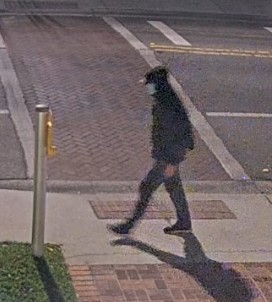
by Beth Kassab | Jan 27, 2026 | News, Police and Public Safety, Uncategorized
Police Release Image of Possible Suspect in Winter Park Church Fire
Police asked the public for information in the case of a person who cut down a banner with a rainbow flag on the lawn of First Congregational Church of Winter Park and set it on fire near the church doors
Jan. 27, 2026
By Beth Kassab
The Winter Park Police Department on Tuesday released an image captured from surveillance video that shows a possible suspect in the fire set at First Congregational Church of Winter Park that targeted a banner that said “Everyone is welcome here” over a sky blue background with a rainbow flag.
The photo appeared to show a man on a sidewalk in dark clothing wearing a hat and possibly a face mask. The man is also wearing dark shoes with white soles. It wasn’t clear from the information released by the police department where the image was captured or when.

An image released by police shows a potential suspect in the church fire that burned a welcome banner.
The department did not address why it waited a week since the fire that left a pile of ash and minor damage on the eastern double doors of the church to solicit help from the public in identifying a suspect.
“All avenues of investigation are being followed to identify the suspect and determine if the crime committed had a biased-based motive,” a release from the department stated.
Florida statutes call for tougher penalties on misdemeanors and felonies if there is evidence the defendant acted out of hate or prejudice based on the “race, color, ancestry, ethnicity, religion, sexual orientation, national origin, homeless status or advanced age of the victim.”
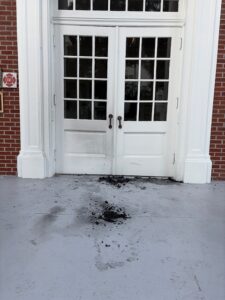
A pile of ash and smoke and heat damage can be seen at the church doors after the banner was set on fire. (Photos courtesy of First Congregational Church of Winter Park)
On Sunday, Senior Minister Shawn Garvey delivered an emotional sermon with a number of notable community members in the pews to show solidarity with the church such as Anna Eskamani, who represents Winter Park in the Florida House, former Mayor Steve Leary, who recently ran for Orange County commissioner, and a number of officials from Rollins College and the Mayflower, a senior community.
Garvey read a statement from Orange County Mayor Jerry Demings that said, in part, “though they destroyed the sign, they can never destroy what’s in your heart.”
Garvey told the congregation that, a times, the church’s long history of social justice work and Christian teachings are principles that “sometimes bring the heat, literally.”
“Bring it …,” he said. “…. If the building disappears, we’ll meet somewhere else. Who cares? They won’t break us.”
Garvey said the church’s newly installed surveillance cameras captured the suspect “making a beeline” toward the welcome banner just before midnight on Jan. 20. The church is widely known for its acceptance and support of the LGBTQ community often represented by the rainbow flag on the banner.
The video shows the person cutting down the banner and bringing it to the church doors before setting it on fire.
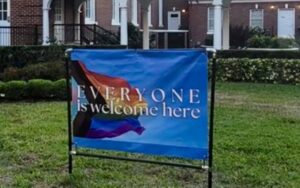
The banner stood on the lawn of First Congregational Church of Winter Park since about Easter until it was cut down and set on fire last week.
A police report released Tuesday says an unidentified witness called police about 11:50 p.m. after smelling smoke and seeing the fire while walking to the Alfond Inn, which is just across Interlachen Avenue from the church.
The fire was quickly extinguished and city Fire Marshal Jim Santoro and Det. Daniel Fritz from the state Bureau of Fire, Arson and Explosives arrived to investigate.
Santoro told the Voice that the state bureau along with Winter Park Police would take the lead in the investigation. He said the fire appeared intentionally set, though it wasn’t immediately clear what was used to start the fire.
He said such cases are unusual in Winter Park.
“This is not very common,” Santoro said. “We probably only get something like this every couple or three years and I’ve never seen one exactly like this and I’ve been with the department 36 years.”
The police report listed potential charges of attempted arson, petty theft and damage to church property.
Police are asking anyone who has any information about the incident to contact Winter Park Det. R. Budde at 407-599-3658 or Crimeline at 800-423-TIPS(8477).
WinterParkVoiceEditor@gmail.com
To comment or read comments from others, click here →
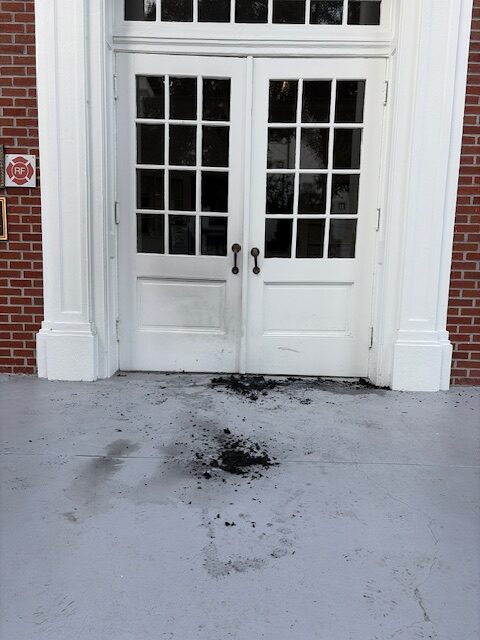
by Beth Kassab | Jan 24, 2026 | News, Police and Public Safety, Uncategorized
Winter Park Church's 'Everyone is Welcome' Banner Cut Down and Set on Fire in Apparent Hate Crime
The incident at First Congregational Church of Winter Park happened earlier this week and appeared to target the church’s welcoming stance toward LGBTQ rights
Jan. 24, 2026
By Beth Kassab
A potential hate crime is under investigation after a banner in front of First Congregational Church of Winter Park with the words “Everyone is welcome here” on a sky blue background and a rainbow flag was cut down by an unidentified man with a knife, placed at the sanctuary door and lit on fire.
The incident happened just before midnight on Tuesday and was caught on security camera footage, said Senior Minister Shawn Garvey, who said he was grateful that a passerby noticed the flames just a few minutes later and called Winter Park Fire Rescue.

A pile of ash remained in front of the doors to the church after the banner fire was extinguished by Winter Park Fire Rescue. (Photos courtesy of First Congregational Church of Winter Park)
“The Fire Department was right there and put it out quickly,” he said. “It could have been worse … at that time of day nobody was on property.”
A pile of ash was left in front of the smoke-stained and heat-damaged white double-doors of the sanctuary. The empty frame that held the banner still stood on the church’s lawn along Interlachen Avenue.
Winter Park Police are investigating, he said, what appeared to be a hate crime against the church’s open and supportive message toward LGBTQ members and the larger community. Winter Park Police could not immediately be reached for comment on Saturday.

The church first added the banner to its lawn around Easter of last year.
“Regrettably in the history of our church, dealing with expressions of hate like that are nothing new,” Garvey said.
The Ku Klux Klan burned a cross on the lawn of the church’s former parsonage (across the street from where the Alfond Inn stands today) in the early 1950’s in response to a sermon that made a case for desegregation in Florida. The church was founded 1884 by New England abolitionists as part of the United Church of Christ, and its members founded Rollins College. It served as a gathering spot for Rollins President Hamilton Holt and Civil Rights leaders like Harry T. Moore and Mary McLeod Bethune to rally against segregation.
More recently, Garvey said, the church saw 50 people line its sidewalk during worship about eight years ago to protest the church because members supported the right to abortion and other reproductive rights. And in the wake of the killing of George Floyd by a Minneapolis police officer in 2020, he said he received angry phone calls about a sign at the church that expressed solidarity with those impacted by Floyd’s death.
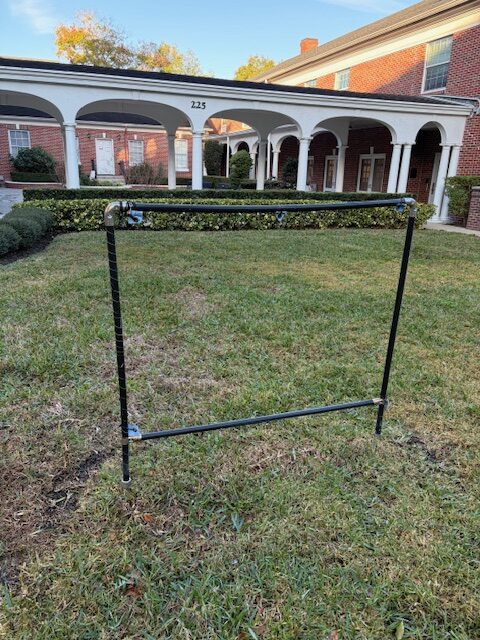
An empty frames stands in front of the church from where the “Everyone is welcome here” banner was cut down.
Garvey said the church’s social justice history is an important part of its fabric.
“Even though it’s sometimes scary and upsetting we still feel called to follow that history,” he said of the congregation that has about 350 members. “The gospel of Jesus speaks strongly to being a voice for the voiceless.”
The church’s web site states that “all of the baptized ‘belong body and soul to our Lord and Savior Jesus Christ.’ No matter who – no matter what – no matter where we are on life’s journey – notwithstanding race, gender, sexual orientation, class or creed – we all belong to God and to one worldwide community of faith.”
More than 140 years into the church’s history, he said, some core challenges remain the same.
“As far as we’ve come and all the work we do, hate is just hate and insecurity is insecurity,” he said.
The video footage captured Tuesday by new security cameras the church installed just weeks before does not show a clear image of the face of the man who cut the banner, which had stood on the church lawn since Easter, and lit the fire. He was wearing a black baseball cap.
He appeared to approach the church on foot from the north and walked directly toward the banner. When a car passed by, he appeared to briefly pretend to be on his phone, before continuing toward the banner where he cut it with a knife and then approached the sanctuary doors to light the fire, Garvey said.
At Sunday’s service, Garvey plans to address the incident and share a number of supportive messages, including one from Orange County Mayor Jerry Demings, he’s received in recent days.
He said people are expressing heartbreak and anger over what happened. But also pride at the church’s presence in the community.
During times like this, Garvey said, the church can “often feel like an island, but we’re not.”
The membership will take up a discussion to determine how or if the “Everyone is welcome here” banner is replaced.
“In our years together since I came to be with you, we’ve gone through a lot,” he told the congregation in an email on Friday. “Through all of it, we have remained strong and grown stronger in our faith and in our commitment to one another. This week is yet another thread of the ongoing tapestry of what we truly are as this church and always have been throughout our history here in Winter Park. We will continue to be the inclusive, loving presence of God as we know it through Jesus and not allow events like this week to deter or frighten us.”
WinterParkVoiceEditor@gmail.com
To comment or read comments from others, click here →
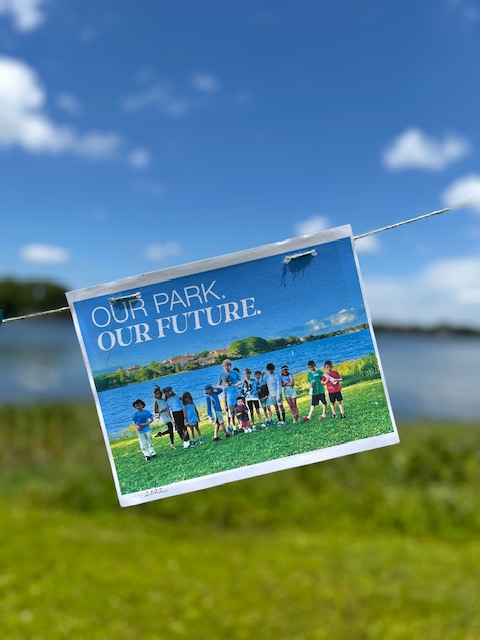
by Beth Kassab | Jan 21, 2026 | Uncategorized
Homeowners Continue Fight in Court Against Virginia Heights Neighbor Over Private Park
At stake, is the use of a shared lakefront lot some residents use to launch kayaks or picnic. The homeowners next to the park want to limit when and how the land is used.
Jan. 21, 2026
By Gabrielle Russon
A neighborhood squabble over a private Lake Virginia park is escalating in court.
Eric and Diane Holm and Brian and Caryn Albertson sued their Virginia Heights neighbor Stephanie Guss over “filthy” kayaks and other complaints about the lakefront neighborhood park that sits between their homes.
The lawsuit was filed in April, but Guss was not served until just before Thanksgiving after Orange Circuit Court Judge Lisa Munyon ordered the lawsuit would be dismissed if the Holms and Albertsons didn’t take action.
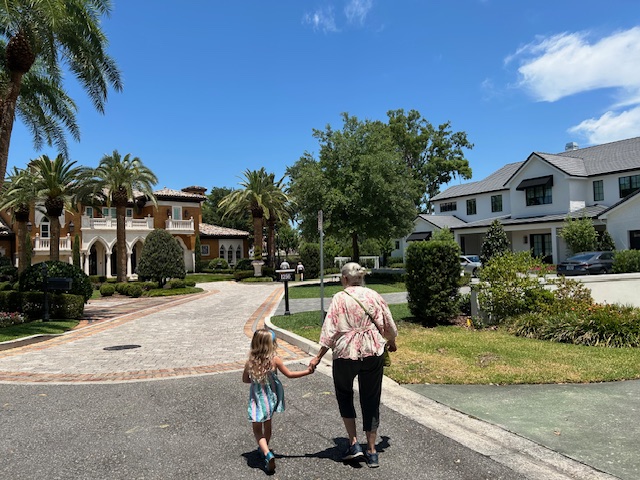
A woman and child walk to the private neighborhood park. The access point may appear to be on private property, but there’s a walkway to the shared lot deeded to Virginia Heights residents.
Since then, neighbors have quietly raised more than $10,000 to help with Guss’ legal bills.
So far, no court hearings have been set on the legal fight in one of Winter Park’s oldest neighborhoods where the park has been a beloved site for community gatherings.
At stake, is how much access neighbors have to the land platted 100 years ago to give residents who don’t own lake lots a spot to launch kayaks, hold picnics or otherwise enjoy views of Lake Virginia, part of Winter Park’s picturesque chain of lakes.
Several neighbors supporting Guss declined to comment for this story because they said they feared they would be sued next.
“Their suit is in essence, only a thinly veiled attempt at asserting a view right over the park — a right they do not possess. The choice of the Holms and Albertsons to pursue litigation over cooperation has devastated the Virginia Heights community,” they wrote in an unsigned letter to the Winter Park Voice. “The result is a culture of fear and intimidation in a once neighborly community.”
But the Holms and Albertsons, who also declined to be interviewed, said in a written statement their lawsuit’s goal “is to get clear, workable guidance that everyone can follow in 2026—so deeded homeowners can enjoy the park while the adjacent homes can maintain reasonable privacy and security.”
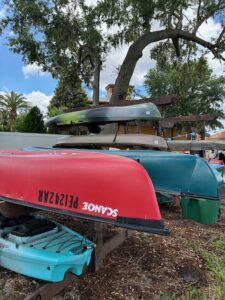
Kayaks are stored on a rack in the private park on Lake Virginia.
The two families said they want better signs to keep the public out of the park and daylight park hours only. They also would like all boats and personal storage out so “the park isn’t treated as a storage area and so rules are consistent and transparent for everyone.”
“We consider ourselves respectful neighbors, and we’re asking for the same respect in return — especially given the park’s immediate proximity to two backyards,” the two families said in a statement.
Holm, a major Republican donor who has hosted Vice President J.D. Vance for lunch at his home and a philanthropist who operates multiple Golden Corral, Peach Valley Cafe and Jersey Mike’s Subs locations, bought his property in 2008 for $3.1 million. Albertson paid $3.1 million for his property in 2020 and built his house in 2024.
But the neighbors argued they held a community meeting in September and agreed to make several improvements. They said they were blindsided when Guss was served with the lawsuit two months later.
“Virginia Heights has responded not with anger, but with resolve,” the neighbors said in the unsigned statement. “We remain open to good-faith discussions about park management, safety protocols, and maintenance responsibilities. … But dialogue requires mutual respect and a genuine willingness to work together, not ultimatums backed by legal threats.”
“We believe shared spaces should be managed for the benefit of all, not redesigned to favor two households.”
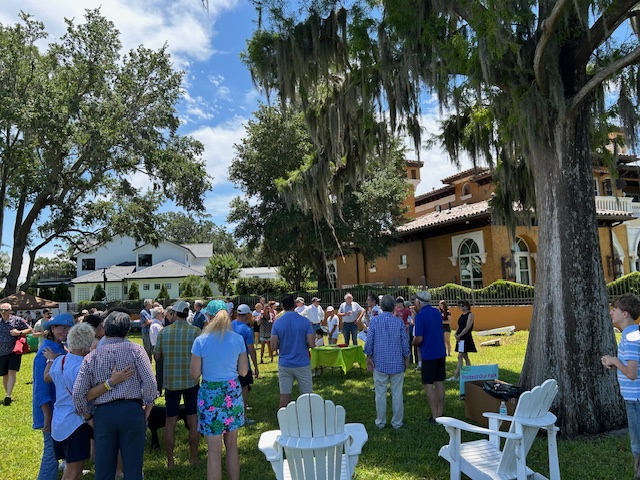
Neighbors gathered last year at the park with homes belonging to Brian Albertson and Eric Holm in the background.
In the April lawsuit, the Holms and Albertsons said neighborhood residents left about 30 kayaks, lifejackets and oars to take up space in the storage racks at the park.
“Many of the kayaks in and around the Racks are filthy, showing no signs of use within the last year or more and are covered in dust, dirt, and mildew,” the lawsuit said.
The Holms and Albertsons also said bushes had been planted at the park “for the sole purpose of interfering with Plaintiffs’ use and enjoyment of their properties,” the lawsuit said, adding they also saw someone doing drugs in the park.
The neighbors downplayed the Holms’ and Albertsons’ allegations raised in the April lawsuit.
“The ironies are striking: claims of safety concerns that have never been reported to police; demands to remove ‘filthy’ kayaks that families use regularly; assertions that trees planted to protect shoreline ecology are ‘obstructions’; suggestions that a gate and limited hours would somehow improve community access,” they wrote in their letter.
Guss, who was named in the litigation because she helped with the boat rack inquiries, also declined to be interviewed for this story.
“Plaintiffs believe that Defendant has co-conspirators that are yet-to-be-identified members of the community,” the April lawsuit said.
The Holms and Albertsons also unsuccessfully sued Guss in 2024 to find out the kayak owners’ names.
Both sides in the neighborhood fight also believe a 1971 court order could help their case. The court judgement ordered the former owners of the properties now occupied by Holm and Albertson to take down wire fencing and landscaping they put in the park after they were challenged by Virginia Heights residents.
“It’s more than 50 years old, and people in the neighborhood interpret it differently,” Holm said in an email. “The only way to get clarity—and to make sure everyone is working from the same rules—is to obtain an updated, definitive order from the court.”
WinterParkVoiceEditor@gmail.com
To comment or read comments from others, click here →
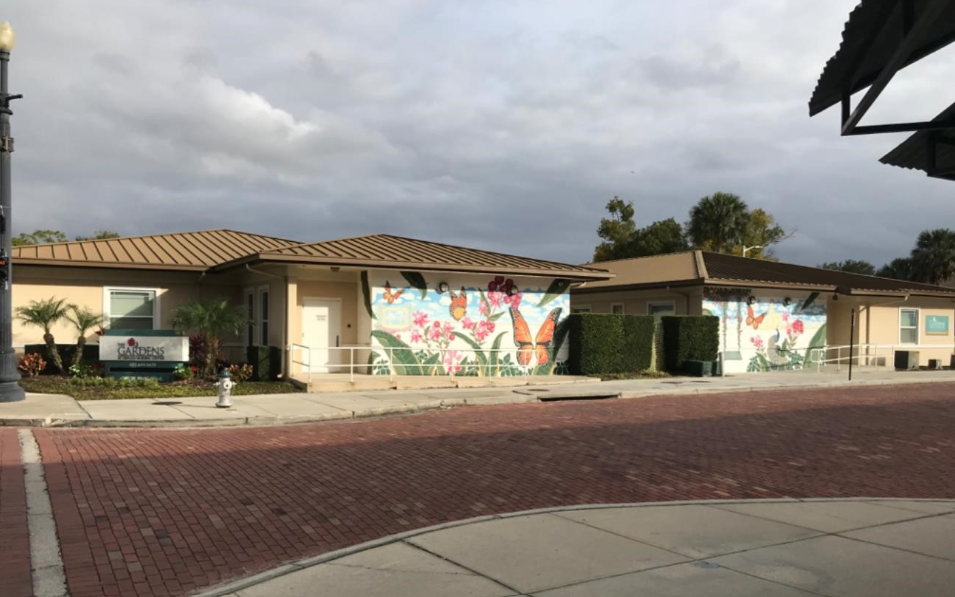
by Beth Kassab | Jan 15, 2026 | Uncategorized
DePugh Nursing Center Sold for $5.4 Million
The money will go to the Elizabeth Morse Genius Foundation to fund other local needs
Jan. 15, 2026
By Beth Kassab
Zane Williams paid $5.4 million for the Gardens at DePugh Nursing Center and the dollars will go to the Elizabeth Morse Genius Foundation to fund charitable causes.
Rick Baldwin, who served as chairman of DePugh’s board of directors, said the nursing center association will be dissolved and the money from the sale will help support other local needs through the foundation.
Baldwin, who also serves as a trustee at the Morse Genius Foundation, did not confirm the sale price, which was listed on records for the Orange County Property Appraiser.
The new owner of the 1.7 acre property at 550 W. Morse Blvd is listed as Z 17, LLC, a company registered to Williams at the address of Z Properties.
Williams, who last week announced plans for a mixed-use development on the site, did not immediately respond to a request for comment about the sale and how the proceeds will be used.
Baldwin said the Morse Genius Foundation supported the DePugh center over the years and he felt comfortable that it would also responsibly use the proceeds from the sale to fund other needs.
“Our mission was to take care of the less fortunate,” Baldwin said of DePugh, noting that mission aligns with the foundation’s history of giving.
According to its website, the foundation has also supported arts groups such as the local ballet and opera along with Rollins College, the University of Central Florida’s nursing college and social services groups such as the Boys and Girls Club, Grace Medical Home and others, including the Welbourne Nursery and Preschool in Winter Park and Winter Park Day Nursery.
The new development at the DePugh site will bring further change for the historically Black neighborhood west of Park Avenue that dates back to the city’s founding. The area has undergone significant gentrification over the past 25 years with the redevelopment of Hannibal Square and a number of larger homes replacing small, single-story houses.
The DePugh center opened in 1956 as the first state-approved nursing home where aging Black residents could seek care during segregation. The center was named for Mary Lee DePugh, who moved to Winter Park in 1937 to work for a white family she knew from the Chicago area and began advocating to provide health care to those in need as part of her work with the Ideal Woman’s Club, which she founded on the west side of the city. She died before the center opened.
Baldwin said he remains saddened by DePugh’s closure last year.
“I hate it that the nursing home had to close but you can pick up the paper every day and see what’s happening to Medicaid,” he said.
Medicaid didn’t even cover half of a day’s care for residents by the time the center closed, he said.
“It just wasn’t sustainable the way they cut all those reimbursements,” he said. “We tried for years. It’s heartbreaking, but I know it’s happening all over the country, it’s not just here.”
WinterParkVoiceEditor@gmail.com
To comment or read comments from others, click here →
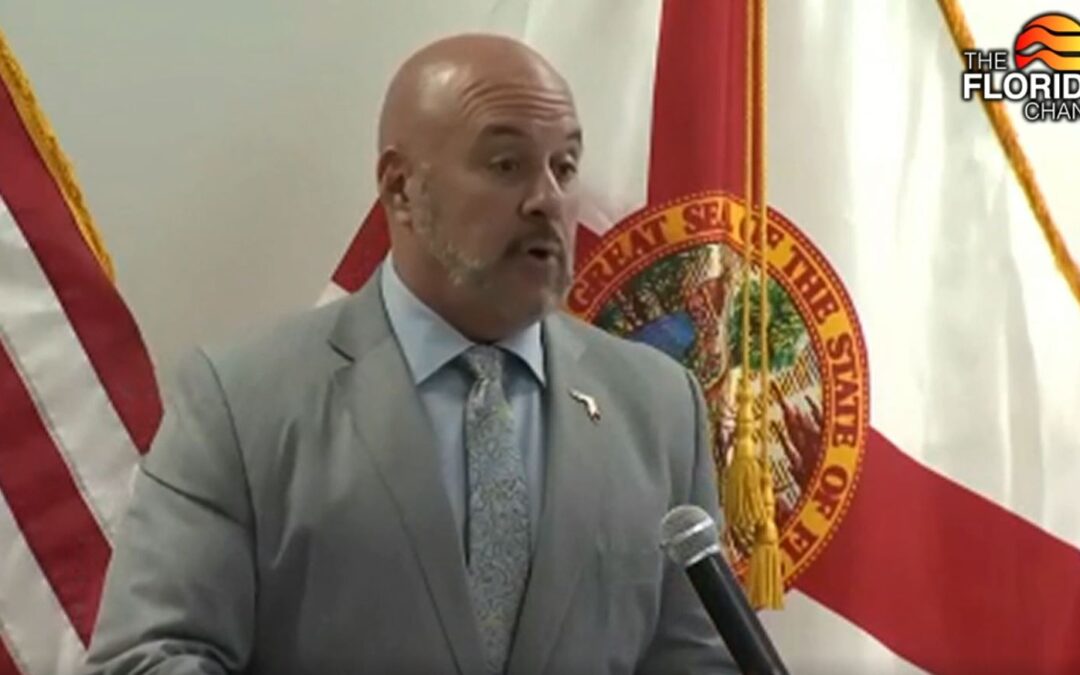
by Beth Kassab | Dec 18, 2025 | Arts and Culture, City Commission, Taxes, Uncategorized
Arts Board Backs Off Seven Oaks Sculptures Because of Spending Optics
The decision came this week just days before state CFO Blaise Ingoglia held a press conference in Winter Park on Thursday to call city governments “wasteful”
Dec. 18, 2025
By Beth Kassab
Winter Park’s Public Art Advisory Board this week hit the pause button on spending as much as $175,000 on permanent sculptures for Seven Oaks Park after City Manager Randy Knight appeared at the meeting to warn of bad optics and even a potential budget shortfall if Gov. Ron DeSantis is successful in his drive to reduce property taxes.
“Is that something we’d be criticized for?” Knight asked of the potential expenditure. “Should we wait and see what’s coming before we decide to spend that kind of money on public art?”
The decision by the board, which includes new Commissioner-elect Elizabeth Ingram, is evidence of a chilling effect on local governments brought by the DeSantis administration’s attacks on local spending and threat to significantly decrease local tax revenue.
Without mentioning Winter Park a single time, state Chief Financial Officer Blaise Ingoglia, who is running for re-election, held a press conference in the city on Thursday morning.
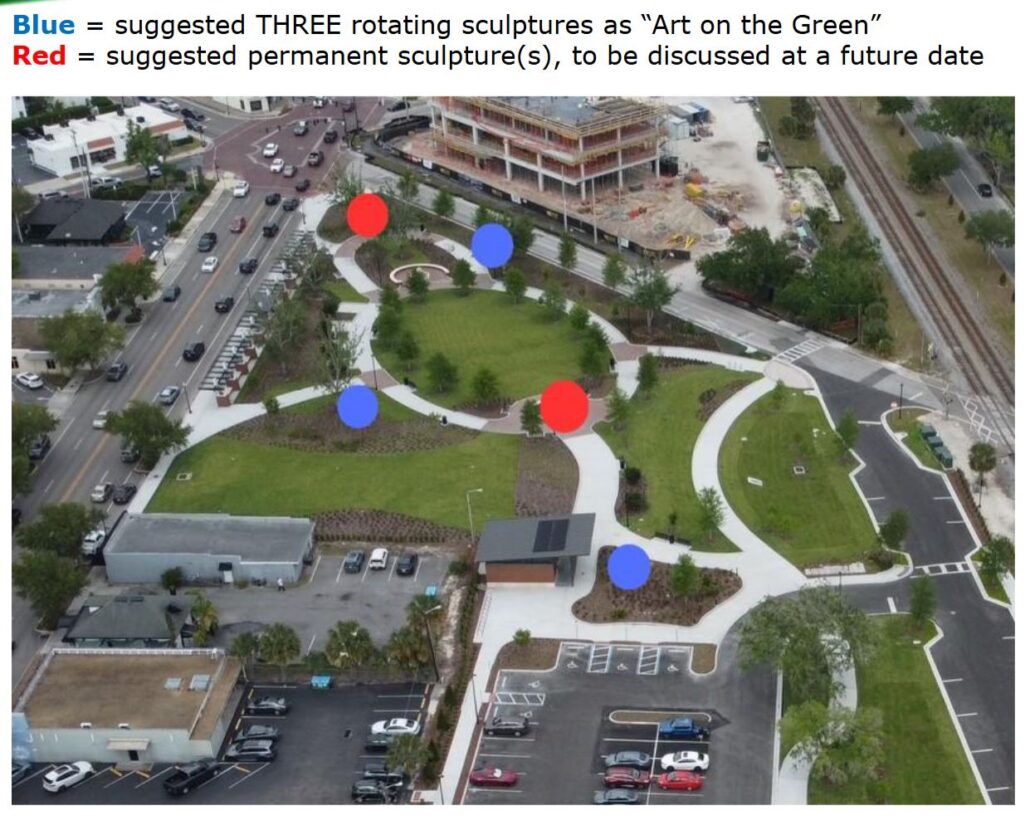
A city graphic shows the proposed location of artwork in Seven Oaks Park.
He repeatedly called cities and counties “wasteful” of public dollars, particularly money collected through property taxes.
But he didn’t cite any examples of cities with bloated budgets that he attributed, in large part, to hiring more staff that far exceeded a city’s need based on its population.
Ingoglia announced a proposal for a new law that would require cities and counties to post their budgets online (which is already required by state law) and to post proposed budget amendments seven days in advance of the hearing. His proposal also would require local governments to identify at least 10% worth of cuts as part of the budget process, though fire and police could not be part of those reductions.
He said the law change would prohibit cities from considering if a business is minority or women-owned when handing out contracts.
Ingoglia called for the end of “the practice of DEI in contracts,” which he said stands for “division, exclusion and indoctrination.”
“Stop with this crap,” he said.
Ingoglia’s office did not immediately respond to a question from the Voice about why the event was held in Winter Park.
The plan for the Seven Oaks Park sculptures came about as part of the city’s public art initiative to promote culture and visitation in Winter Park’s newest public space, which opened earlier this year.
Winter Park is known as one of the top tourism draws in the region and logged 1.4 million visitors to the downtown in 2024.
A plan to bring rotating loaned artwork from Orange County to the park in January is still underway. But the board hit the brakes on purchasing new art to remain in the park permanently.
Arts Board Chairwoman Carolyn Fennell thanked Knight for the information and guidance and noted that the city should “maintain its arts and cultural branding.”
“We all know the importance of arts in our city but others looking in may not have the same value of art as you do or certainly as we do as a community,” Knight said during the meeting.
WinterParkVoiceEditor@gmail.com
To comment or read comments from others, click here →

by Beth Kassab | Dec 12, 2025 | City Commission, News, Uncategorized, Zoning and Development
Via Tuscany Homeowner Owes More Than $300k in Code Fines
Construction on the house began in 2018 and just concluded this year, prompting repeated complaints by neighbors
Dec. 12 , 2025
By Beth Kassab
The owner of an ultra modern mansion on the corner of Via Tuscany and Howell Branch Road owes more than $331,000 in code enforcement fines after the City Commission refused the man’s request to eliminate the fines he accumulated during nearly seven years of construction.
Fernando Bermudez, the owner of the home through Casselberry-based Developer and Builder Group LLC, told city officials in a letter dated Sept. 5, 2025 that the drawn-out construction timeline was the result of complications brought on by COVID-19, which killed one of his partners, and Hurricane Ian, which struck in September of 2022.
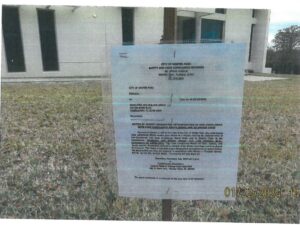
A snapshot included with Winter Park code enforcement documents shows a notice of violation posted in front of the home.
But the construction process at 2661 Via Tuscany started long before those events when the first permit was granted by the city in September of 2018. The certificate of occupancy for the 4-bedroom, 4,500-square-foot house was finally issued in July of this year.
Bermudez, who attended the City Commission meeting on Wednesday, said through his attorney that he was unaware of the fines and blamed a number of problems on his contractors, which changed repeatedly during the project.
But Gary Hiatt, building and permitting director, showed commissioners minutes from a Code Enforcement Board hearing in November of 2022 that showed Bermudez was in attendance and spoke along with a contractor about the timeline of the project. At that meeting, the board ordered that fines of $250 a day per violation would begin accumulating if the house wasn’t completed in 60 days, according to records.
“There were multiple times where they gave us, ‘We’ll be done by here or we’ll be done by here,’ and it just never came to fruition,” Hiatt said.
Violations, which included allowing permits to expire without completing the project and failing to meet deadlines, went on in at least one case for more than 900 days and, in another, more than 300.
“The incomplete vacant structure remains a public nuisance,” the code board concluded in a March 23, 2023 order that said fines would continue and the city would place a lien on the property.
In his letter to city officials to request the fines and lien be eliminated, Bermudez claimed ignorance about the existence of the fines and detailed how construction materials ordered from Europe were delayed by the pandemic as well as how the project was impeded by his own illness and the loss of his partner to the virus.
A Realtor.com listing for the property, which is now up for sale for $6.6 million (more than $1,400 per square foot), boasts of two primary suites (one on each floor), lighting fixtures from Greece, Italian porcelain flooring and “unparalleled craftsmanship, high-end finishes, and an open-concept layout for those who appreciate architectural brilliance and luxury living.”
The house, “follows commercial-grade construction standards, making it a bunker-style fortress unlike any other,” according to the listing.
But Bermudez wrote that the amount of the fine is “a debt impossible for us to pay.”
He said “the real estate market is now extremely slow” and he faces potential foreclosure by a private lender.
But commissioners said they didn’t hear any good reasons to reduce or eliminate the fines.
“These are legitimate fines in my opinion,” Commissioner Craig Russell said, noting that Bermudez’s company had developed other houses so should have had some familiarity with the process.
Russell and Commissioner Warren Lindsey also noted how the lengthy construction process affected the neighborhood.
Neighbors complained to the city about the project repeatedly, citing the unfinished work, debris and other violations.
“Overall, the process has been unprofessional (single workers showing up after hours or on weekends as if the whole project is some sort of shady after thought), unnecessarily drawn out and damaging to our property,” one neighbor wrote the city.
WinterParkVoiceEditor@gmail.com
To comment or read comments from others, click here →
















Recent Comments